
Originally an old cinema, the Golden Torch (often abbreviated to just 'The Torch') was redeveloped as a luxury nightclub by Chris Burton, a Midlands businessman, in 1963. Featuring a Roman chariot on the outside wall, the club was classy, with marble pillars and the now compulsory balcony overlooking the dance floor.
Originally designed to hold about five hundred people, in it's heyday it hosted in excess of one and a half thousand; which, as the club was situated in a quiet residential street, was only the start of the club's problems.
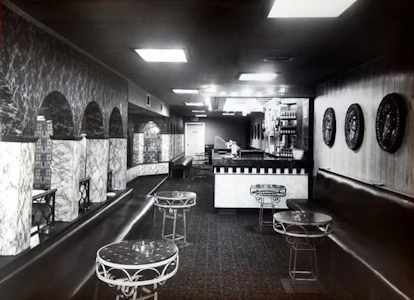
The club first opened to the public in 1965, focusing on the Mod culture of the day. As was the norm at the time, many live acts appeared here, including Billy J Kramer, Amen Corner, the Kinks and Wayne Fontana and the Mindbenders. The first soul act didn't appear until 1967, when Inez and Charlie Foxx appeared.
The DJs were typical of their time, more entertainers than anything, with the music being incidental to their on-stage antics. The resident DJ was "Barmy" Barry, who had a huge following in the Stoke area. A certain London nightclub owner, Peter Stringfellow, also DJ'd there in between spots at the Mojo in Sheffield. Although a certain amount of soul and Motown was played, it wasn't until 1969 that an actual soul night began.
It was Keith Minshull that started it all. When he suggested the idea of a Friday soul night to Chris Burton, Chris was very dubious about the whole thing, but gave it a try anyway. The result was a resounding success. Burton was heard to comment "I remember turning up at the first one and saying to Keith 'Are these guys for real?' I mean there was no presentation or anything, just a room full of kids dancing to music that I'd never heard of". (Manifesto Magazine).
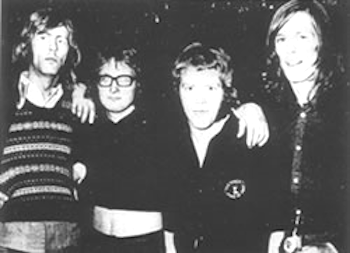
and Colin Curtis
Soon joined by his friend, the eighteen-year-old Colin Curtis (actually his name is Colin Dimond), Minshull and Curtis formed the Kingspinners, and proceeded to astound the dancers with more and more imported soul. A chance meeting with Simon Soussan, the now infamous French record collector, opened the door to a floodgate of quality sounds.
Keith and Colin were joined by Alan Day and Martyn Ellis, and with the closure of the Twisted Wheel in 1971, Keith Minshull suggested to Chris Burton that perhaps it would be a good idea to try an all-nighter... and so the legend began.
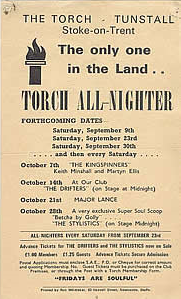
It was in 1972 that the all-nighters began, running from 8pm to 8am, Saturday night through Sunday morning. As there was really no other competition, it soon became the top venue in the country, attracting other DJs such as Tony Jebb and even Ian Levine. Attracting soulies by coach and train from across the Midlands and as far as Scotland and London the venue managed to regularly squeeze in 1300 people in a club designed for 500. Alan Day would DJ at the Catacombs in Wolverhampton on a Saturday night and then head off up the road to The Torch. He would be followed by a convoy of up to 50 cars avoiding the police using stealth tactics that would be more at home on the 80s Rave circuit!.
Live acts appeared on a regular basis, featuring The Drifters, The Stylistics, Oscar Toney Jr, The Chi-Lites, Edwin Starr, and many more.
Of course, the one live act synonymous with the Torch is Major Lance. Appearing there on December 9th, 1972, the performance was recorded live,
and released as
'Major Lance Live At The Torch' on Contempo, the label owned by Blues & Soul magazine.
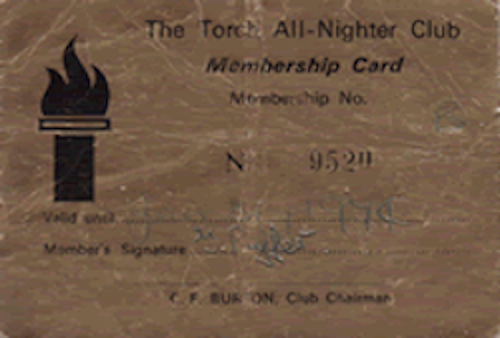
Above and beyond the live appearances, the Torch had become a veritable goldmine for soul discoveries, as the following have all been credited as having first plays there:
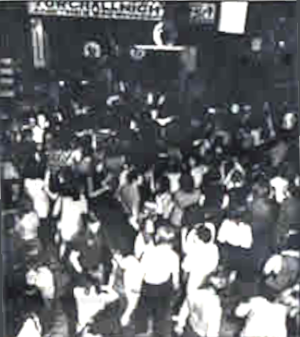
As with every success story, there are the inevitable problems. With overcrowding, after-hours drinking and drugs leading to an almost permanent police presence at the all-nighters, Chris Burton did his best to co-operate with and pacify the local authorities. When attempting to re-new the club's licence in 1973, he encountered massive opposition.
With the local paper carrying headlines such as "TUNSTALL CLUB A DRUG CENTRE" and "70 PERCENT OF CLUB USERS 'INVOLVED WITH DRUGS'", plus complaints from the local residents about noise (including one complainant who testified that the all-nighters kept his horse awake!) it was inevitable that on March 16th 1973, the licence was refused. Chris Burton did not appeal, and the club just faded away. There was no celebratory last all-nighter. In the words of Dave Evison "It just fizzled out".
Interestingly, Chris Burton later became the driving force behind the 1970's Out Of The Past bootleg label.
Your Comments on The Golden Torch
No comments on this Venue yet.
You can add a comment to this Venue using the form below. Entries will be moderated, so please be respectful!